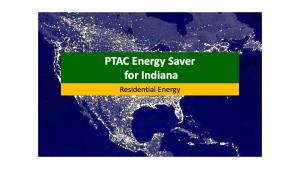
TIME TO ACT: Save 20% or more on HVAC. It’s important now more than ever for a sustainable future!
Optimizing PTAC units with a “smart” device is a fast, easy, and cost-effective way to achieve Residential HVAC Energy Savings. A Packaged Terminal Air Conditioner is a type of self-contained heating and air conditioning system commonly found in: Hotels, Motels, Senior Housing Facilities, Hospitals, Condominiums, Apartment Buildings, and Add-on Rooms & Sunrooms.
Business owners and homeowners face increasing challenges with energy costs to save energy and money in Indiana. PTAC Energy Saver offers an Adaptive Climate Controller (ACC). It is a proven HVAC energy saving devicethat quickly installs on PTAC units. There are many companies that claim to produce energy savings, but the ACC device is multi-panted and proven over many years. Plus, it has extensive validation tests by organizations such as:
- ConEdison, Manhattan Plaza New York City
- Environmental Test Laboratory, Ohio
- EME Consulting Engineers (Third Party), Sponsored by NYSERDA, New York
- State University of New York, Oneonta, NY
- Tim Garrison (Third Party Testing)
- McQuay Cooling Tests
- Purdue University Tests (Phoenix)
- ConEdison Tests by ERS
Typically, when an HVAC system turns off, shortly after, the blower fan motor turns off. The ACC reprograms the blower fan not to shut off but to throttle back the rpm airflow to an exceptionally low speed, quiescent level airflow or “idle speed”. This allows for a gentle but continuous air movement into the building that helps keep equilibrium of climate conditions in the occupied space and saved energy.
PTAC Energy Saver can help you navigate the complexity of HVAC energy saving choices: CONTACT PTAC Energy Saver
Here is an example of some Residential HVAC Energy Saving info for Indiana:
Are Heat Pumps a Good Choice for Indiana Residents?
Indiana weather can be, well, rather sporadic, making the need for an efficient way to heat and cool your house extremely prominent in the Hoosier state. While air conditioners and furnaces are a common combination, many homeowners are opting to install heat pumps for year-round comfort control.
Homeowners who aren’t familiar with these systems often wonder whether the heat pumps that Indiana residents seem to love are worth the switch from their traditional HVAC systems.
Star Heating & Cooling discusses the pros and cons of installing a heat pump in the Hoosier state so you can make an informed decision when it’s time to install new heating and cooling equipment for your home.
Advantages of Heat Pump Installation in Indiana
Homeowners all across the country are making the switch to heat pumps for their HVAC needs for a variety of reasons. Installing a heat pump in your Indiana home can deliver these valuable benefits:
Energy Efficient Heating
Air conditioners and heat pumps perform virtually the same for cooling. The big difference between these two HVAC systems is that heat pumps are able to heat homes as well, while air conditioners obviously cannot. When used in heating mode, the real differences in energy efficiency are on display between heat pumps and conventional heating units like gas furnaces.
Cold Weather Performance
Homeowners are often under the impression that heat pumps do not operate efficiently when temperatures are extreme, as they often are some days during our winters. The truth is heat pumps still operate very efficiently even during cold weather. However, a unit’s efficiency does decline as temperatures drop below freezing.
Better Humidity Control
Are heat pumps good to use in Indiana? For humidity control, yes. High humidity can make the heat feel much more uncomfortable in summer and gas heating can further dry out already dry winter air – the heat pumps that Indiana homeowners use throughout the year provide better comfort and humidity control than conventional HVAC systems, which is an important plus for Hoosier homeowners.
Heat pumps tend to dehumidify air better than conventional air conditioners. When using an air source heat pump instead of a gas furnace in the winter, you won’t experience any additional drying of the air inside your home, as is common with gas heating.
Safer Heating
Well-maintained gas furnaces aren’t typically a danger to Indiana families, but a neglected gas heating unit can certainly become a hazard. When natural gas is used to fuel heating systems, there is always a possibility, however small, that a gas leak could occur. Carbon monoxide is a byproduct of the combustion process gas furnaces use to create heat – neglected furnaces can suffer cracked heat exchangers and other flaws that allow the home’s air to mix with carbon monoxide, and exposure can occur inside the home.
Lower Impact on the Environment
In 2022, the world is more environmentally aware than ever before. Between electric cars and solar panels, people everywhere are doing their part. Unfortunately, if you live in an older home with traditional HVAC systems, you are putting more emissions out than you have to.
An electric heat pump is much better for the environment. Traditional systems are burning fossil fuels, which could be avoided when switching to a heat pump in your home.

